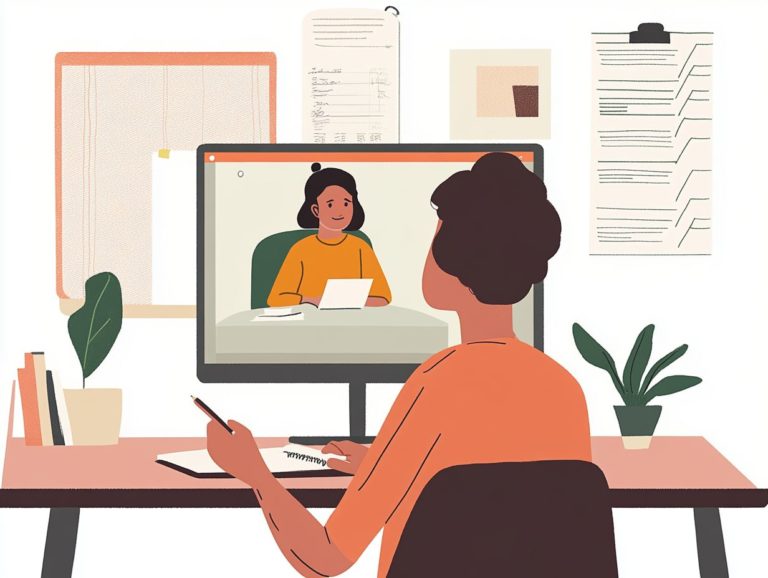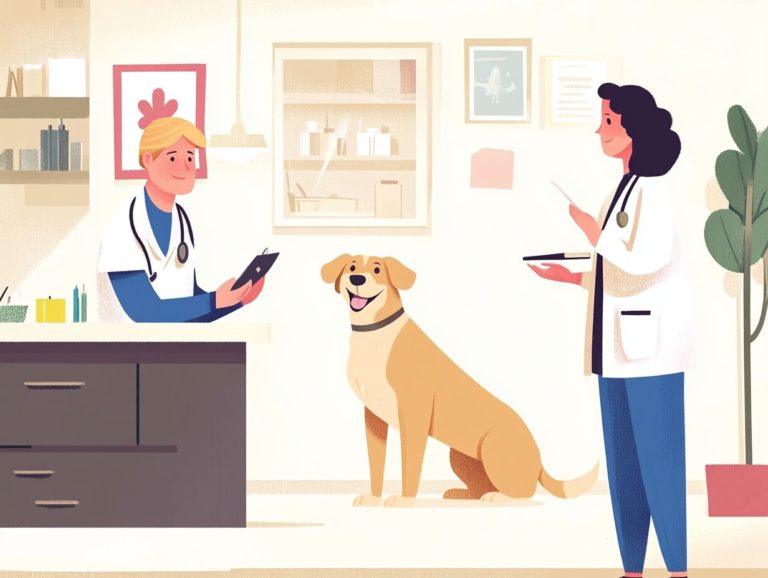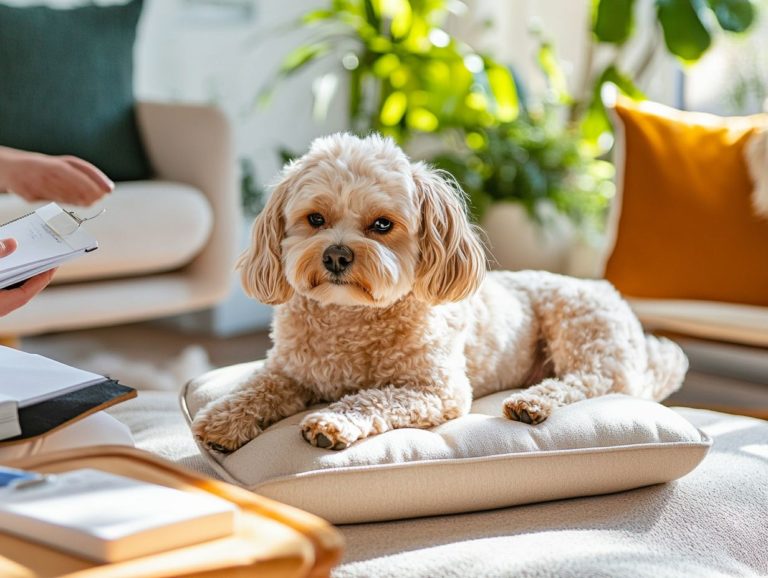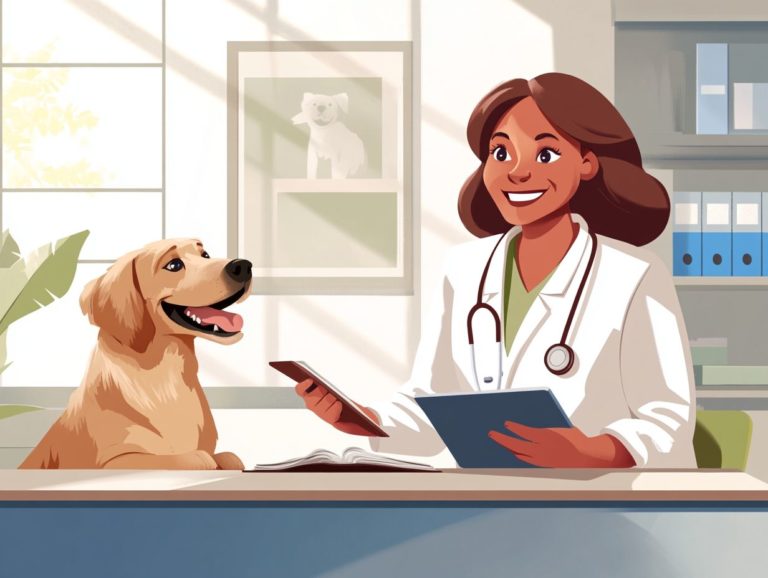What to Do if Your Pet’s Anxiety Worsens
Does your furry friend seem anxious? You’re not alone. Pet anxiety is a common challenge for many dog owners, and it can show up in various ways, like excessive barking or withdrawal. Understanding the underlying causes and symptoms is essential for effective management.
This article delves into practical strategies designed to alleviate anxiety, helping you recognize when professional intervention is warranted and exploring treatment options for more severe cases.
It also guides you in creating a soothing environment for your pet, alongside long-term strategies to prevent anxiety relapse, ensuring that your furry companion feels safe and secure.
Contents
- Key Takeaways:
- Understanding Pet Anxiety
- Managing Pet Anxiety
- When to Seek Professional Help
- Treatment Options for Severe Anxiety
- Supporting Your Pet During Treatment
- Preventing Anxiety Relapse
- Frequently Asked Questions
- What should I do if my pet’s anxiety worsens?
- What are some signs that my pet’s anxiety is worsening?
- How can I help my pet cope with their worsening anxiety?
- What are some natural remedies for managing my pet’s worsening anxiety?
- What should I avoid doing if my pet’s anxiety worsens?
- When should I seek professional help for my pet’s worsening anxiety?
Key Takeaways:

- Don t wait! Recognize the signs of pet anxiety, such as excessive barking or hiding, to address the root cause before it worsens.
- Implement effective strategies, such as exercise and calming techniques, to help manage your pet’s anxiety.
- Seek professional help if your pet’s anxiety becomes severe; various treatment options are available, including medication and therapy.
Understanding Pet Anxiety
Understanding pet anxiety is crucial for you as a dog owner. It ensures the well-being of your beloved companion.
Different forms of anxiety such as separation anxiety, fear-related anxiety, and anxiety associated with aging can profoundly impact a dog’s behavior and overall health.
By identifying the underlying causes and recognizing common symptoms, you can develop a more effective treatment plan and implement behavioral modification strategies. Resources like the AKC and the Merck Veterinary Manual offer invaluable insights into anxiety disorders in dogs, enabling you to take informed actions for your pet’s happiness and health.
Causes and Symptoms
The causes of dog anxiety can vary greatly, encompassing issues like separation anxiety, cognitive dysfunction syndrome (a condition similar to dementia in older dogs), and various environmental triggers. Recognizing the symptoms is essential for ensuring timely intervention.
You might notice common signs that suggest your dog is feeling anxious, such as excessive barking, which often signals distress or a plea for attention. Inappropriate urination indoors is another indicator, frequently associated with panic or fear. Aggression may also arise when your dog feels threatened or overwhelmed, leading to defensive or territorial behaviors.
Environmental changes, like moving to a new home or loud noises such as thunderstorms and fireworks, can intensify these feelings.
Understanding the underlying issues contributing to your dog’s anxiety is not just about offering comfort; it s also about crafting effective coping strategies for a happier, more secure pup.
Managing Pet Anxiety
Managing your pet’s anxiety effectively necessitates a carefully designed treatment plan tailored specifically to your dog’s unique needs.
Strategies like counterconditioning, music therapy, and engaging in calming games can significantly alleviate anxiety symptoms while also addressing any underlying behavioral issues.
Effective Strategies and Techniques
Implementing effective strategies for managing dog anxiety involves using desensitization methods and behavioral modification techniques. Engaging in calming activities, like soothing games and music therapy, can significantly contribute to reducing anxiety levels.
By gradually exposing your dog to anxiety-inducing stimuli in a controlled environment, desensitization enables them to learn how to remain calm in situations that once triggered stress. For instance, if your dog is uneasy around loud noises, playing recordings of those sounds at a low volume can help them acclimate over time.
In conjunction with this, counterconditioning can transform your dog’s emotional reactions by pairing these stimuli with positive experiences, such as treats. Engaging in calming games think puzzle toys or hide-and-seek provides mental stimulation and redirects their focus away from anxiety.
Additionally, music therapy can cultivate a serene atmosphere; studies show that certain types of music, particularly classical music or soft instrumental, can lower heart rates and alleviate stress, making it a valuable tool in anxiety management.
When to Seek Professional Help

Knowing when to seek professional assistance for your dog s anxiety is vital for their overall health and happiness.
Engaging with experts like veterinarians and dog trainers can provide valuable insights and customized strategies to effectively tackle severe anxiety symptoms.
Identifying Signs of Worsening Anxiety
Identifying signs of worsening anxiety in your dog is essential for ensuring timely intervention. Watch for behavioral changes, such as increased aggression, frequent urination indoors, or excessive barking, as they may signal a developing anxiety disorder.
Also, pay attention to more subtle indicators that your dog might be experiencing heightened anxiety levels. For instance, if your dog starts displaying compulsive behaviors like tail chasing or repeated licking, it could be a sign of distress.
Changes in eating habits like a loss of appetite or an unexpected obsession with food are also significant red flags.
If your typically social dog begins to isolate themselves or avoid interaction with family members or other pets, it s a strong indication that anxiety might be setting in. Recognizing these symptoms early can make a substantial difference in addressing the underlying issues, ultimately ensuring your furry companion remains happy and healthy.
Treatment Options for Severe Anxiety
To treat severe anxiety in dogs, a blend of medications and natural therapies can significantly enhance their quality of life. Options like SSRIs (Selective Serotonin Reuptake Inhibitors) such as fluoxetine and clomipramine along with benzodiazepines, have proven effective in alleviating anxiety symptoms.
You can help your furry friend find a sense of calm. Consider options like Rescue Remedy to promote a peaceful state.
Medications and Therapies
Medications and therapies are essential for managing dog anxiety, especially when behavioral modification strategies fall short. Common anxiety medications like SSRIs or natural therapies such as CBD oil can offer substantial relief.
These treatments target brain chemicals that help control mood, stabilizing emotions and diminishing fear responses. For example, SSRIs boost serotonin levels, which are known to promote a sense of calm, while medications like Trazodone serve as effective sedatives during stressful moments.
On the natural side, options such as valerian root and CBD oil provide a gentler approach to alleviating anxiety, steering clear of the side effects often linked to traditional pharmaceuticals.
Incorporate behavioral modification techniques like positive reinforcement training and desensitization to create a comprehensive strategy. This holistic approach addresses the underlying causes of anxiety and ensures effective long-term management.
Supporting Your Pet During Treatment
Supporting your pet through anxiety treatment means crafting a serene environment and recognizing the vital role of exercise. By addressing behavioral issues with love and patience, you can significantly enhance your dog’s mental well-being.
Creating a Calming Environment

Creating a calming environment for your dog can significantly impact their anxiety levels. Techniques like music therapy and natural remedies can transform what might be a stressful space into a peaceful sanctuary.
To enhance this tranquil atmosphere, consider introducing gentle, soothing music specifically designed for canine relaxation. Many pet owners have discovered that playing soft classical tunes or specially curated playlists can work wonders in reducing restlessness.
Aromatherapy is another essential element; using diffusers filled with calming essential oils like lavender or chamomile can cultivate a sense of security and tranquility for your furry friend.
Don t underestimate the importance of proper exercise routines; daily walks or gentle play sessions can help release pent-up energy, promoting both physical and mental relaxation.
By integrating these strategies, you can create a serene space that truly supports your dog’s canine health.
Take the first step today; your furry friend deserves a happier, more relaxed life!
Preventing Anxiety Relapse
To prevent anxiety relapse in your dog, it s essential to adopt long-term management strategies that emphasize exercise importance and a deep understanding of your pet’s needs.
By incorporating regular exercise and establishing a structured routine, you can greatly diminish the chances of future anxiety episodes.
Long-term Management Strategies
Using long-term management strategies for anxiety prevention is crucial for ensuring your dog’s mental well-being. Regular exercise combined with behavioral modification techniques and natural therapies can significantly contribute to a stable emotional state.
Be consistent with these strategies to help your dog feel secure. Monitoring your dog’s progress is key, as this allows you to identify any changes in behavior or anxiety triggers over time.
Integrating various therapies like calming music, aromatherapy, or even acupuncture can further enhance the effectiveness of traditional training methods like counterconditioning and desensitization. By combining these approaches, you can create a holistic plan that not only addresses immediate anxiety but also cultivates long-lasting resilience, ultimately resulting in a happier, more balanced furry companion.
Frequently Asked Questions
What should I do if my pet’s anxiety worsens?
If you notice that your pet’s anxiety is getting worse, especially signs of fear-related anxiety, it’s important to take action. Start by trying to identify the cause, such as potential behavioral issues related to cognitive dysfunction syndrome a condition similar to dementia in dogs or aging anxiety, and then take steps to address it.
You may also want to consult with a veterinarian or animal behaviorist for additional support and guidance.
What are some signs that my pet’s anxiety is worsening?
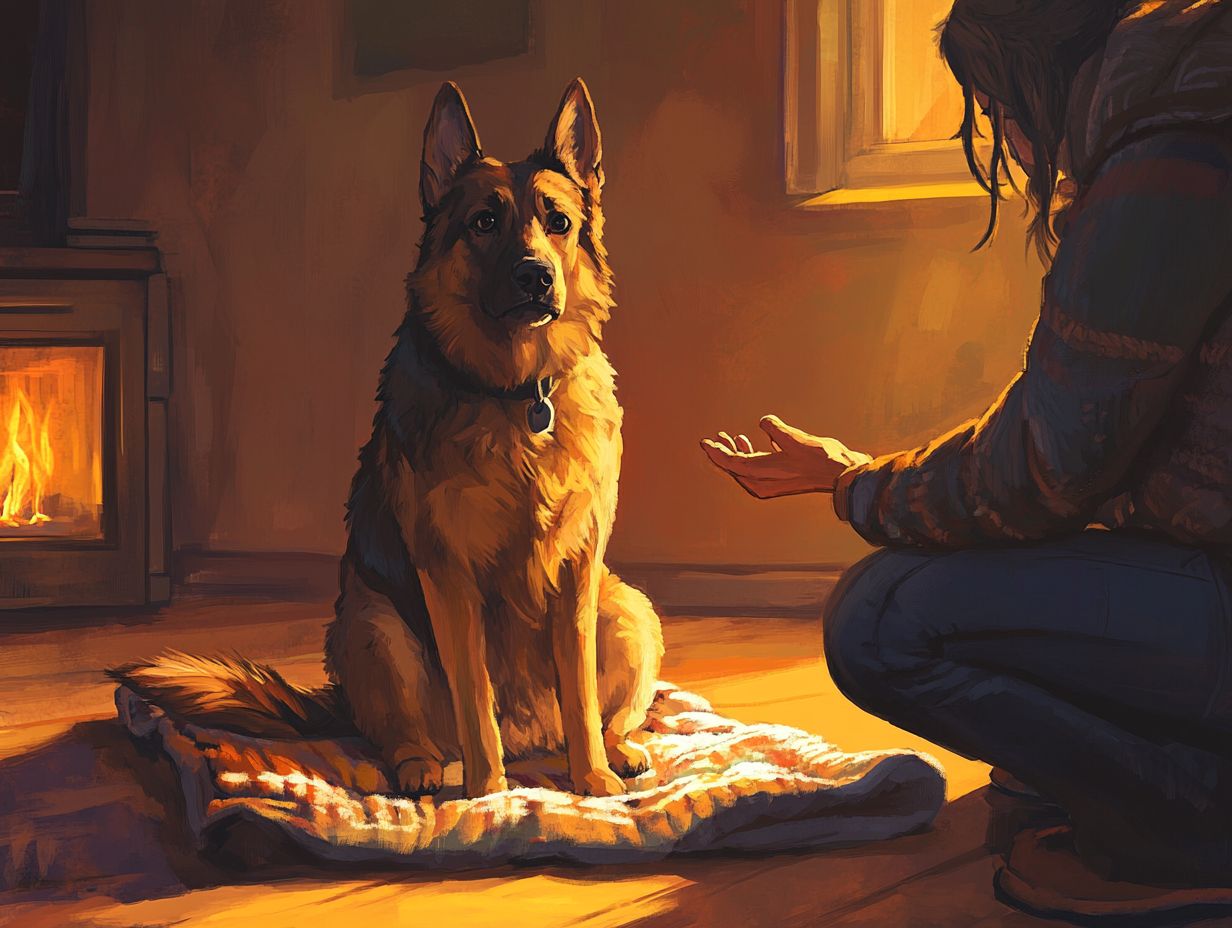
There are several signs that may indicate your pet’s anxiety is getting worse. These include increased vocalization, destructive behavior, changes in appetite or sleeping patterns, and avoidance of certain situations or people. If you notice these behaviors, it may be time to consider when to consult a professional for pet anxiety and take appropriate action.
How can I help my pet cope with their worsening anxiety?
There are a variety of ways you can help your pet cope with their anxiety. This may include providing a safe and comfortable space for them, using calming aids such as pheromone sprays or supplements like CBD oil, and engaging in behavioral modification techniques with the guidance of a professional, such as a dog trainer or a veterinarian.
What are some natural remedies for managing my pet’s worsening anxiety?
There are several natural remedies that may help your pet’s anxiety. These can include herbal supplements, CBD oil, Rescue Remedy, and aromatherapy. However, it’s important to consult with a veterinarian before trying any new remedies to ensure they are safe and appropriate for your pet, especially when exploring options in the Merck Veterinary Manual.
What should I avoid doing if my pet’s anxiety worsens?
It’s important to avoid punishing or scolding your pet for their anxious behavior. This can actually worsen their anxiety and create a negative association with the trigger, possibly leading to aggression signs or increased anxiety symptoms.
Instead, focus on positive reinforcement and providing a safe and calm environment for your pet, incorporating calming games and regular exercise to aid in anxiety prevention.
When should I seek professional help for my pet’s worsening anxiety?
If you have tried various techniques and remedies, but your pet’s anxiety continues to worsen, it may be time to seek professional help. A veterinarian or animal behaviorist can provide a thorough evaluation and inform you about what to expect during a pet anxiety assessment to create a personalized treatment plan that may include SSRIs like fluoxetine or clomipramine, behavioral methods, or other anxiety medications suitable for your pet.
Is your dog showing signs of anxiety? Don t hesitate! Reach out to a vet for guidance.


